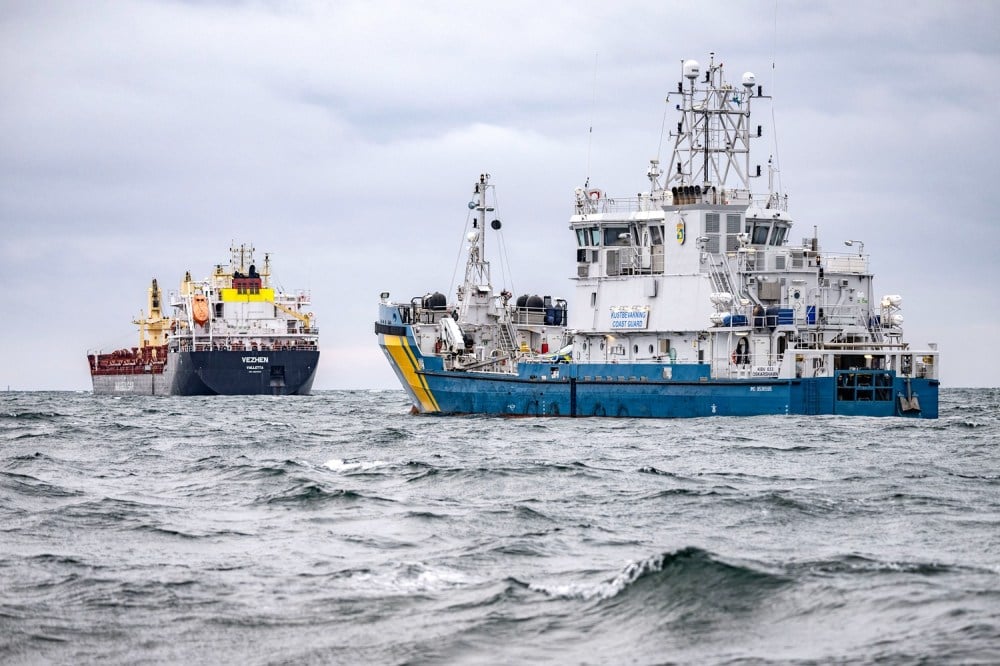Baltic coastal states are stepping up their legal enforcement measures to further pressure Russia’s continued use of a so-called shadow fleet of tankers to circumvent Western sanctions and fund its war on Ukraine.
On Tuesday, Sweden and Germany joined Denmark as coastal nations that will request insurance paperwork from tankers transiting their waters or headed for the vital Danish Straits, the key chokepoint for Russia’s exports of crude oil and oil products.
While it seems like a niggling bureaucratic and paperwork measure, the lack of proper insurance (principally to pay for the cost of any oil spills) is both the biggest fear Baltic nations have of Russia’s aged and under-regulated fleet and a good indicator of nefarious activity. The idea is that ships without proper insurance—the European Union just banned a big Russian insurer that it said had been providing dubious cover for Moscow’s shadow fleet—will be added to the already large and growing roster of blacklisted vessels by the United States, the United Kingdom, and the EU. That is meant to further constrain Russia’s ability to sidestep Western sanctions on its energy sector and keep financing the war.
“If we are looking for which ones are the real problems, they would be the ones who don’t want to show their papers,” said Kristina Siig, a professor of maritime law at the University of Southern Denmark.
Since Russia’s invasion of Ukraine in early 2022, Western countries have slowly and often grudgingly taken steps to target Russia’s sprawling energy sector, which accounts for the bulk of the country’s government revenues. A key part of that was a price cap on Russian oil exports that would limit the Kremlin’s income while preserving global oil markets. To evade sanctions, Russia increasingly began shipping oil on illicit, unregistered, often very old vessels with dodgy flag status and questionable insurance and which frequently eschew the use of specialized navigators provided by Denmark to safely transit narrow and dangerous coastal passages. By late last year, that shadow fleet had become the primary conduit for Russia’s crude oil exports to countries such as China and India.
In fits and starts, but especially over the course of this year, the United States, the U.K., and the EU have taken aim at the specific ships that Russia relies on for its shadow fleet. With the latest EU sanctions package—its 17th since 2022 —Brussels alone has now sanctioned more than 340 vessels; a proposed 18th package would put the number above 400. With the United States and the U.K. adding another 300-plus, more than 10 percent of the global tanker fleet is now on the global watchlist.
The result has been encouraging: Russia’s revenues from fossil fuels fell in May (the latest month with full figures available) to the lowest levels since the war began. More to the point, more than half of Russian oil exports in May were carried in tankers compliant with Western requirements and thus theoretically to the $60 cap on Russian oil sales; only about 46 percent were carried on shadow fleet tankers, a big drop from the beginning of the year. (Efforts to tighten that cap to $45 a barrel floundered last month at the G-7 summit in Canada on U.S. objections.)
Part of that shift back to regular tankers is happening because Russian oil is so cheap anyway that complying with the still-relatively high price cap means no financial pain, since Russian Urals crude sells for less than $60 a barrel. But part of it is a reflection of continued efforts to blacklist Russia’s alternative hulls.
The problem, from the point of view of Baltic states such as Denmark and Sweden, is that the tankers that continue to engage in an increasingly risky trade are on the whole older and less reliable and prompt even more fears of a catastrophic oil spill that would massively impact multiple countries in the region.
“It’s a self-created monster,” Siig said. “This trade now will appeal less and less to the risk-averse shipowners, so it will appeal to those that are not risk-averse. In a highly polluting trade, that is not what you want—you want the ‘I am wearing a belt and suspenders’ kind of people.”
That is why countries such as Sweden and Germany are, like Denmark, taking baby steps toward a more aggressive interpretation of their maritime rights, steps that seemed just a year ago to be legally risky, by interfering, however slightly, with the unfettered and innocent passage of ships through international waters.
Russia predictably calls the new insurance requirements “piracy,” though it patently is not. But Moscow does have a point that coastal states that start to question innocent passage while they are at peace risk a slippery slope that could undermine the global rules of the waterways.
“It’s not ‘piracy,’ but that doesn’t mean there aren’t limits, and we have to be sure we don’t overstep them,” Siig said.
The whole issue is muddied by Russia’s suspected use of shadow fleet tankers to carry out sabotage activities in the Baltic, including the severing of undersea cables. (The latest alleged Russian activity, after years of jamming GPS navigational signals, seems to be efforts to jam and spoof radars used for maritime navigation, though that appears to be a shore-based effort rather than actions carried out by the shadow fleet.) While the sabotage gives European states another reason to worry about Russia’s use of shadow fleet vessels, it complicates the tidy legal arguments (such as in Article 220 of the U.N. Convention on the Law of the Sea) about preventing oil pollution that they rely on to take actions against those vessels.
Still, more than three years into Russia’s war in Ukraine, the latest paperwork battles are a sign that European states are increasingly stepping up, even in small ways, to fill the gap left by the Trump administration’s refusal to increase sanctions pressure on Russia or to provide promised military aid to Ukraine.
The trick is to do so without blowing up the entire legal architecture that Europe, and especially the smaller states around the Baltic, rely on for peaceful commerce and dispute resolution.
The post Papers, Please: How Europe Is Cracking Down on Russia’s Shadow Fleet appeared first on Foreign Policy.




